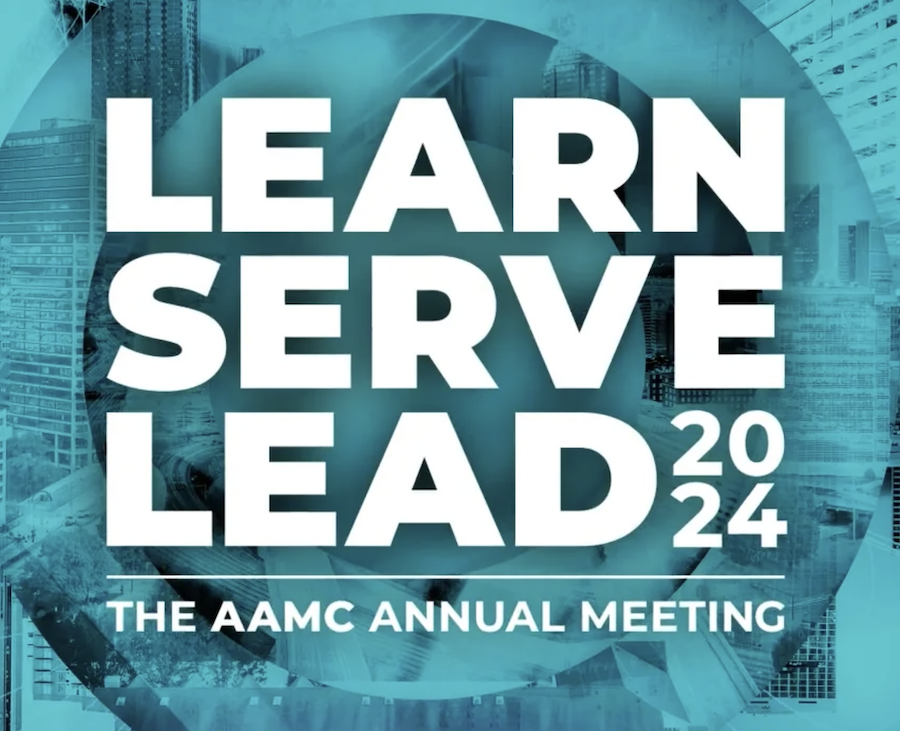The Association of American Medical Colleges (AAMC) hosted its annual Learn Serve Lead conference Nov. 8-12, 2024, in Atlanta, Georgia.  The conference gathered leaders and professionals from across academic medicine to discuss pertinent issues in health and health care.
The conference gathered leaders and professionals from across academic medicine to discuss pertinent issues in health and health care.
Sessions were led by “60 Minutes” correspondent Scott Pelley and senior vice president of Microsoft Health, James N. Weinstein, DO, MS. Kizzmekia S. Corbett-Helaire, PhD, and David Fajgenbaum, MD, MBA, MSc, also presented on the future of scientific discoveries and innovative medical solutions.
The UAB Heersink School of Medicine was represented at the conference by a variety of deans, faculty, staff, and students. Winter Williams, M.D., co-director of the Clinical Reasoning and Integrated Skills Program (CRISP), graciously agreed to detail his experience and provide insight into his takeaways from the 2024 conference.
Williams’ conference experience kicked off on Friday with a day-long session focused on clinical skills educators. The Directors of Clinical Skills Education (DOCS) annual meeting focused on a topic that was threaded throughout the entire weekend: artificial intelligence.
“I appreciated hearing practical applications and innovations from colleagues around the country,” Williams noted. “The breakouts and poster sessions detailed what people are doing day-to-day with A.I. For example, some teams are using A.I.-based transcriptions of patient encounters in their OSCE centers to provide immediate feedback and ensure students are asking the right questions.”
On Saturday, the opening plenary session featured Scott Pelley, “60 Minutes” correspondent and former anchor of the “CBS Evening News.” He spoke about the heroism of medical professionals and the importance of unity through divisive times in our nation’s history.
Sunday morning for Williams began with a POCUS session that discussed its implementation and rollout in institutions around the country. He noted the benefit of being able to hear from folks who are “boots on the ground” in these institutions and hearing their testimonies. Being able to connect with these colleagues is one of the powerful aspects of the annual AAMC conference.
Sunday also featured a plenary session by James Weinstein, DO, MS, senior vice president at Microsoft Health, who discussed his optimism and concern about the future of A.I. in medicine. He provided examples and use cases for the technology and spoke about its evolving roles within the field.
Another notable pair of sessions for Williams focused on STEP 1. Discussions centered around the exam going pass/fail and the lessons learned since, including outcomes and downstream effects. Another session focused on its timing during medical school. Whereas it has traditionally served as a gateway moving from 2nd and 3rd year, it is now becoming a more varied experience. Professionals from different institutions shared their experience with variable timing of STEP 1, with some institutions offering it right after 1st year, others after clerkships, and still others that let students decide the timing.
“There did not seem to be a right or wrong timeline,” Williams said. “Presenters instead stressed the importance of the timing fitting within the overall curriculum.”
Williams did note that some reported the additional flexibility unexpectedly led to increased stress on students, as they questioned the optimal time of year to complete it. The benefit of autonomy seemed to come with tradeoffs for some that may need additional support and advising.
Williams emphasized the networking opportunities at Learn Serve Lead 2024 as impactful. He commended the conference for offering both formal and informal ways to connect with colleagues from around the nation. Sessions like DOCS are set up to bring together professionals from specific subsets of educators. This allowed him to relate to others experiencing the same issues and breakthroughs he sees day to day. The informal sessions such as lunch and learns or table talks also provided plenty of opportunities to meet fellow medical professionals.
“Being at the conference with my own institutional colleagues was also a great experience. We were able to connect and discuss novel ideas in a way that we often can’t due to competing demands and busy schedules. Overall, it was an enriching experience to be there with them.”
Click here to learn more about Learn Serve Lead 2024 and to read round-up articles or view videos from throughout the conference.